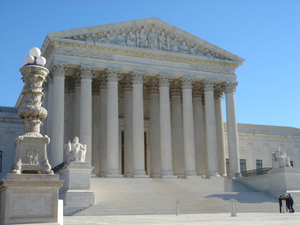 In a much anticipated decision, the Supreme Court issued its opinion this morning in Association for Molecular Pathology v. Myriad Genetics, Inc. In an opinion by Justice Thomas, joined by Chief Justice Roberts, Justices Kennedy, Ginsburg, Breyer, Alito, Sotomayor, and Kagan, and Justice Scalia concurring in part, the Court held that a naturally occurring DNA segment is a product of nature and not patent eligible merely because it has been isolated, but determined that cDNA is patent eligible because it is not naturally occurring.
In a much anticipated decision, the Supreme Court issued its opinion this morning in Association for Molecular Pathology v. Myriad Genetics, Inc. In an opinion by Justice Thomas, joined by Chief Justice Roberts, Justices Kennedy, Ginsburg, Breyer, Alito, Sotomayor, and Kagan, and Justice Scalia concurring in part, the Court held that a naturally occurring DNA segment is a product of nature and not patent eligible merely because it has been isolated, but determined that cDNA is patent eligible because it is not naturally occurring.
Noting that "[i]t is undisputed that Myriad did not create or alter any of the genetic information encoded in the BRCA1 and BRCA2 genes," the Court acknowledged that "[t]o be sure, [Myriad] found an important and useful gene," but indicated that "separating that gene from its surrounding genetic material is not an act of invention." Justice Thomas also stated that Myriad's claims were not "saved by the fact that isolating DNA from the human genome severs chemical bonds and thereby creates a non-naturally occurring molecule" because "Myriad's claims are simply not expressed in terms of chemical composition, nor do they rely in any way on the chemical changes that result from the isolation of a particular section of DNA."
 The Court, however, also determined that "cDNA does not present the same obstacles to patentability as naturally occurring, isolated DNA segments." In particular, Justice Thomas explained that "cDNA retains the naturally occurring exons of DNA, but it is distinct from the DNA from which it was derived," and therefore, "cDNA is not a 'product of nature' and is patent eligible under §101." Justice Thomas did provide one caveat, however, noting that "insofar as very short series of DNA may have no intervening introns to remove when creating cDNA," under such circumstance, "a short strand of cDNA may be indistinguishable from natural DNA."
The Court, however, also determined that "cDNA does not present the same obstacles to patentability as naturally occurring, isolated DNA segments." In particular, Justice Thomas explained that "cDNA retains the naturally occurring exons of DNA, but it is distinct from the DNA from which it was derived," and therefore, "cDNA is not a 'product of nature' and is patent eligible under §101." Justice Thomas did provide one caveat, however, noting that "insofar as very short series of DNA may have no intervening introns to remove when creating cDNA," under such circumstance, "a short strand of cDNA may be indistinguishable from natural DNA."
Importantly, the opinion concludes by stating that "[i]t is important to note what is not implicated by this decision." In addition to noting that the case did not involve an innovative method of manipulating genes while searching for the BRCA1 and BRCA2 genes or new applications of knowledge about the BRCA1 and BRCA2 genes, the Court also indicated that it did not consider the patentability of DNA in which the order of the naturally occurring nucleotides has been altered. Instead, the Court indicated that it was "merely hold[ing] that genes and the information they encode are not patent eligible under §101 simply because they have been isolated from the surrounding genetic material."
Patent Docs will provide additional analysis of the opinion in a subsequent post.